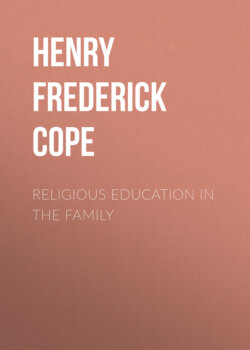Читать книгу Religious Education in the Family - Henry Frederick Cope - Страница 7
На сайте Литреса книга снята с продажи.
§ 3. WIDER CHILD-WELFARE
ОглавлениеThis age knows that man does not live by bread alone. Interest in child-welfare is for the sake of the child himself, not for the sake of his clothes or his physical condition. Concern about soap and sanitation, hygiene and the conveniences of life grows because these all go to make up the soil in which the person grows. There is danger that our emphasis on child-welfare may be that of the tools instead of the man; that we may become enmeshed in the mechanism of well-being and lose sight of the being who should be well. To fail at the point of character is to fail all along the line. And we fail altogether, no matter how many bathtubs we give a child, how many playgrounds, medical inspections, and inoculations, unless that child be in himself strong and high-minded, loving truth, hating a lie, and habituated to live in good-will with his fellows and with high ideals for the universe. Modern interest in the material factors of life is on account of their potency in making real selfhood; we acknowledge the importance of the physical as the very soil in which life grows. But the fruits are more than the soil, and a home exists for higher purposes than physical conveniences; these are but its tools to its great end. Somehow for purposes of social well-being we must raise our thinking of the family to the aim of the development of efficient, rightly minded character. The family must be seen as making spiritual persons.
